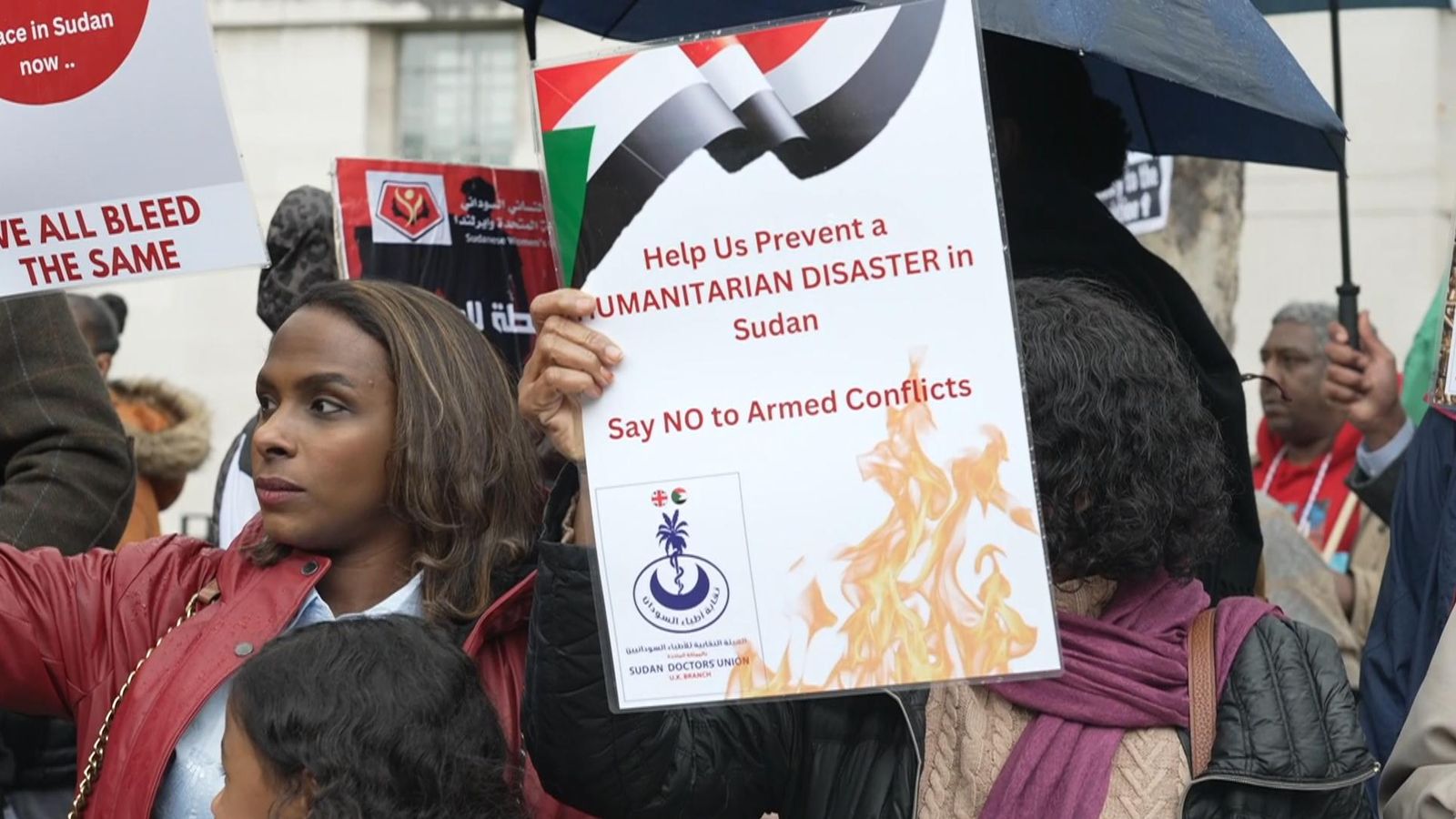Calls for Britons trapped in war-torn Sudan, including NHS doctors, to be helped after diplomats rescued

Britain’s Sudanese community is demanding the government does more to help bring their relatives – including NHS doctors – back from Sudan.
Two planes were sent out from RAF Akrotiri in Cyprus to evacuate UK diplomats and their families from Khartoum – but other British citizens have not yet received support to leave the country.
Prime Minister Rishi Sunak said the evacuation of the diplomats and their dependents was “complex and rapid” and followed threats to embassy staff in the capital.
More than 400 people have died and thousands have been injured in a bloody conflict between the Sudanese army and a powerful paramilitary group known as the Rapid Support Forces.
NHS medics are some of those caught up in the violence.
The Sudanese Junior Doctors Association UK (SJDA-UK) said it was aware of 71 Sudanese NHS doctors currently trapped in Sudan “because of the ongoing conflict”.
It tweeted: “We are concerned for their safety and the safety of their spouses and children.”
About half of those doctors are believed to be British nationals.
Dr Shaza Faycal’s young children, brother and mother are in Khartoum and trying to return to the UK after travelling to Sudan for a holiday to celebrate Eid.
Advertisement
Dr Faycal, a trustee of SJDA-UK, said she was “quite stressed”, adding: “It’s literally war happening there. What we would like to see is all NHS doctors who are now trapped there with their families to be evacuated, as a form of priority.”
Despite the rain and the crowds that gathered for the London Marathon, Sudanese protesters defiantly gathered outside Downing Street to try to put pressure on the government to help British citizens who are stranded in the country.
Mohammed Baraka, one of the demonstrators, said: “All my family is in Sudan and they are in a very serious condition.
“I’ve been speaking to my younger brother, he is literally imprisoned in his apartment – no electricity, no water supply and this morning the internet supply was disconnected.”
Please use Chrome browser for a more accessible video player
4:38
UK ‘committed’ to help Brits in Sudan
Read more from Sky News:
How elite team of British troops evacuated UK diplomats from warzone capital
British-Sudanese woman trapped by deadly clashes in Khartoum tells of harrowing ordeal
Mr Baraka added: “We want this war to stop now, and I mean now. If this war continues, Sudan will be finished.”
The Foreign Office has not yet confirmed how many British citizens are in Sudan but it is thought there are hundreds.
Please use Chrome browser for a more accessible video player
1:12
Brit in Sudan: ‘We feel we need to get out’
Foreign Secretary James Cleverly chaired a sixth Sudan Cobra session on Sunday night to discuss the “escalation” of violence in the African nation.
Mr Cleverly said the Conservative administration remained “absolutely committed to supporting” Britons in the country.
But he said that until a ceasefire is reached, ministers were “severely limited in our ability to provide assistance to British nationals”.
Senior opposition MPs said they are “deeply concerned” about the welfare of British nationals still in Sudan.
In a joint statement, shadow foreign secretary David Lammy and shadow defence secretary John Healey said: “We need to know about government plans to help them and the steps the UK is taking to support an immediate ceasefire.”
Please use Chrome browser for a more accessible video player
1:40
British passports don’t guarantee evacuations, says former security officer
Their comments came after the Irish government said it planned to send a team to Sudan to evacuate Irish citizens.
France, Greece and other European countries have said they are organising evacuations for embassy employees and nationals, along with some citizens of allied countries.
US special forces also evacuated about 70 of its staff from Khartoum on Sunday but Washington has so far said it remains too dangerous to carry out a mass evacuation of citizens.
Click to subscribe to the Sky News Daily wherever you get your podcasts
The official advice for UK nationals in Sudan is to register their presence with the Foreign Office and to stay indoors.
Mr Cleverly said: ”I would say to British nationals in the region – please register with us.
“We have circulated a link so we know who is there, where they are, so if an opportunity arises, we can find a way of helping them.”